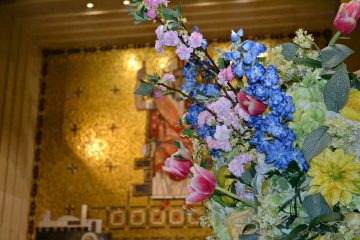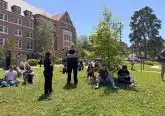Jewish, Maronite families celebrate 50 years of running popular restaurant together

IMAGE: CNS photo/Debbie Hill
By Judith Sudilovsky
HAIFA, Israel (CNS) — In the seaside restaurant called Maxim owned by the Mattar and Tayar families, customers speak in Arabic and Hebrew while enjoying Middle Eastern specialties. While that’s not so unusual in this northern coastal town, the eatery’s ownership is.
The Mattar family is Israeli Arab and Maronite Catholic. The Tayar family is Jewish. Both have roots in Lebanon.
Their business venture has existed for 50 years.
Although tensions among Arabs and Jews have resurfaced across Israel, the two families flourish in a business partnership that began with a friendship among Shabtai Tayar and brothers Sharbel and George Mattar a half-century ago.
“After the death of the first generation and the involvement of the second generation in running the restaurant, we have become a symbol of coexistence,” said Tony Mattar, 48, whose cousin, Sharbel, who is George Mattar’s son, co-manages the restaurant.
In 1965, it was impossible for a seafront property to be sold to an Arab, so in addition to putting up a third of the sum for the purchase, Tayar put up his name as a front so the three-way business deal could go through.
That cooperation has never waned as successive generations of both families work side by side to ensure the popular restaurant’s success.
Maxim has not been without its challenges. Oct. 4 marked the 12th anniversary of one of Israel’s worst terrorist attacks when a woman suicide bomber set off explosives in the packed restaurant, killing 21 people and injuring 100. Five employees and a member of the Mattar family were killed in the attack.
Today, the restaurant is feeling the effect of tighter security because of heightened tensions among Palestinians and Israelis. Once bustling lunch hours have quieted, leaving the restaurant about one-quarter full on any given day.
Still the diversity remains: A Jewish university student consults with his adviser over a plate of baklava and a cup of tea; an Arab businessman negotiates a deal on his cellphone as he finishes a serving of hummus; three Jewish sisters from nearby towns and one of their husbands enjoy their time together.
The restaurant’s name, Maxim, translates to wonderful in Hebrew. The original partners settled on the name because they thought the idea of their partnership, as well as the ocean view and the location at the entrance to the city were all wonderful, Tony Mattar said.
Tony Mattar was working in the restaurant’s kitchen 12 years ago when the suicide bomber attacked. He recalled how the shop filled with thick, dark smoke. Survivors scrambled out of the wreckage toward him.
“There were so many children, my friends, customers. It was a massacre. We started evacuating those who we could,” he said.
The restaurant was closed for a month, and the families contemplated closing permanently, but customers urged them not to let the forces of evil win.
“If we who have gone through such an attack are able to continue, then other people can’t give up either,” Tony Mattar told Catholic News Service. “Every two years, we have some incident here in this country, whether it is in the north or the south. We both suffer together. They don’t suffer more or we don’t suffer more. We all suffer.”
The young Mattar said his family’s close ties to the Tayars allow both to demonstrate the importance of coexistence and tolerance. He said his family’s Catholic faith has taught them forgiveness and respect for people without regard to race, religion or creed.
“We see this place like an island of life in coexistence, something really special,” said Orly Nir, 63, Shabtai Tayar’s daughter and restaurant co-owner. A silent partner in the restaurant, she is a retired school principal.
“We have total trust in one another. We have never, never fought. We have the same sense of humor,” she said.
“No power in the world can separate us or divide us,” Tony Mattar added. “When people learn to get to know each other’s traditions and culture, when they become friends, it is hard to see them as enemies. Our recipe for coexistence is very simple. Our relationship is the way it is because we look at each other as equals. Our two families have lived together in love and peace. This gives us quality of life. It is real and it is so natural for us.”
Both families know they can be an example for others, he said, and their relationship is a launching point for speaking to groups and media outlets about coexistence and tolerance even in times of tension.
The families grew up together and they still share holidays, birthdays, weddings and deaths. When the elder Tayar’s only son died in 1969 during the War of Attrition between Egypt and Israel, both families mourned his death. The Mattars did not leave the Tayars’ side, Nir recalled. The families also have traveled together. When a Mattar grandchild recently had his first tooth, the families celebrated with traditional foods.
The bond between the families has reached into a third generation. Ronza Mattar, 19, daughter of Mattar brother Ronny, recently was at the front counter squeezing chocolate sauce on a cream and chocolate cake.
“It is an honor to be part of an Arab-Jewish family, to show that it is possible for us to live in peace,” she said. “They are part of our family, it doesn’t matter what religion they are.”
– – –
Copyright © 2015 Catholic News Service/U.S. Conference of Catholic Bishops. www.catholicnews.com. All rights reserved. Republishing or redistributing of CNS content, including by framing or similar means without prior permission, is prohibited. You may link to stories on our public site. This copy is for your personal, non-commercial use only. To request permission for republishing or redistributing of CNS content, please contact permissions at [email protected].













